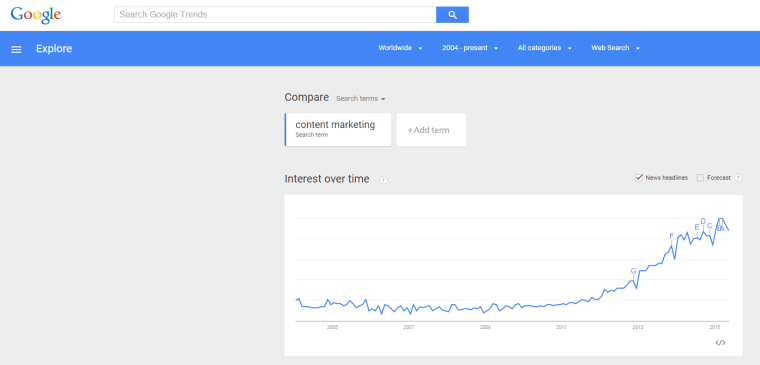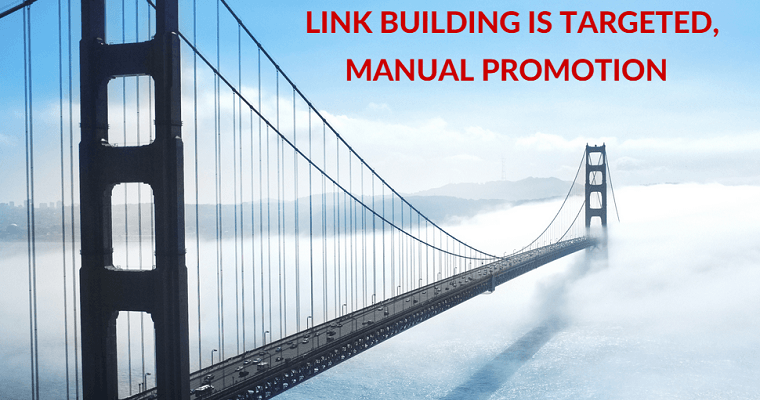Despite what some in the SEO community will say, link building really hasn’t changed. Not that much anyway.
Link building is, and always has been, the manual promotion of your website to another site. This version of link building has existed since Eric Ward practically invented the trade in 1994.
My definition of link building isn’t the only one out there, though. There are others who think of link building as algorithmic manipulation and spam, devoid of any real marketing purposes.
As far as I’m concerned, these tactics completely misrepresent real link building.
Skewed by Spam
I won’t deny that link building has an unfortunate past. There was an arms race of spammy links to manipulate Google’s algorithm, which confuses link building today with spam links of the past. For years and years, many people spammed in the name of link building.
Before Google introduced the Penguin algorithm in April 2012, spam links threatened their business model. A search engine’s business (i.e. Google) is only as good as the amount of trust people put into their results. For many years, spammers were threatening the trust Google had established. Manipulating Google’s algorithm meant less than ideal sites in their search results.
These tactics included everything from hiding links behind html to submitting links to article directories that no human would ever use as an actual resource.
There’s an argument to be made that these practices wouldn’t have existed if it weren’t for Google’s algorithm. At the very least, they wouldn’t have been as prominent. The algorithm has always put a great emphasis on links, but it wasn’t until Penguin that the algorithm could effectively discriminate a natural link from a manipulative one.
As aggressive as Penguin was, it didn’t fully erase the perception of link building as spam. Not immediately anyway.
But now that we’re three years removed from the first Penguin update, it’s become increasingly clear that link building is still valid.
Links continue to be critical to not only organic search visibility, but the entirety of digital marketing campaigns as well. It’s important to realize that link building is promotion.
Link Building is Promotion
Spammers spend their time employing manipulative tactics to game the algorithm, tactics that do nothing to better the online experience for people.
The link building I know and do is far different from this. Link builders conduct industry research, contact other webmasters within the industry, and effectively explain the value our sites provide.
When you boil it down, link building is simply online promotion.
When you build links, you have to engage with the authorities and influencers in your niche. If you want these people to link to you, you have to convince them why it’s worth their while.
There are only two reasons why a site isn’t linking to you:
- They are unaware of your existence
- They’re not convinced a link to your site is necessary to their audience
Both of these reasons can be remedied through link building.
In case A, the website may have never heard of you because you haven’t engaged with them yet. That’s okay – this is why you’re building links in the first place!
If it’s case B, that’s okay too. Some webmasters need convincing. It’s not their job to inherently see the value in your site, pages, content, etc.
It’s your job as a link builder to explain why they should want to link to you.
If there’s a website known as a valuable platform within your industry, you should attempt to engage the people who operate it. Email them, explain the unique value proposition of your site, and why it benefits the reader of their sites. Be explicit.
Either way, you’re promoting your brand. It’s not large-scale promotion, like a 30-second ad on television is. It’s much more personal than that – it’s direct, one-on-one contact with another important person in your industry. It’s real engagement with a real human who cares about your industry much as you. This sort of relationship can lead to plenty of other marketing opportunities beyond link building as well. It’s one of the reasons I love link building.
Link Building Complements All Marketing
Apart from building organic search visibility, link building supercharges your other marketing efforts.
Link building may not have changed, but the online landscape surrounding it is incredibly different.
For example, when link building was in its nascent stages, no online marketers knew what content marketing was. Today, content marketing is all anybody wants to talk about. Take a look at this chart from Google Trends:
 Screenshot taken from Google Trends on May 16, 2015
Screenshot taken from Google Trends on May 16, 2015
The noise surrounding content marketing has resulted in a lot of confusion. I can’t even begin to tell you how many times we’ve had potential clients ask us if content marketing is what we do to secure links.
Let me make this clear: link building and content marketing are NOT the same. They require different skill sets, and they have differing end goals.
Although they may not be the same, the fact is that they can coincide well with each other.
Really, link building can add to any of your online marketing campaigns.
Maybe people don’t click on your PPC ads because your brand hasn’t established much visibility yet. Link building can help. Ranking in organic search will help to cultivate brand recognition.
Maybe people aren’t sharing your amazing content on social media. Link building can help here as well. Remember that the majority of traffic online is directed by search engines. The more visible your content is, the more likely people will find it and share it.
A lack of content visibility will plague a content marketing campaign as well. Once again, link building can help with that. The goal of content marketing isn’t necessarily to build links. People may be reading your content, but not linking to it. A trained link builder will take the time to effectively persuade these people to link to it, creating more opportunities for others to find you in the future.
The point is, that no matter what online marketing strategy you’re using, link building can help. You may be earning links with the other strategies, and more power to you if that’s true. But for every link you earn, there are five more worth building.
Conclusion
Link building hasn’t really changed. Legitimate link building is the same as it ever was. It’s still a promotional tactic that increases your visibility in organic search. It’s a practice that requires you to engage with your relevant community, and to persuade them why your site is valuable.
Real link building isn’t sitting at your computer and exhausting a series of instant submit directories. Penguin eradicated this and other spammy practices, and we should be grateful for it.
Because of Penguin, link building doesn’t have to be a dirty word. We can keep building the natural links your site deserves; the kind of links that will benefit your site and all of your other marketing efforts.





![AI Overviews: We Reverse-Engineered Them So You Don't Have To [+ What You Need To Do Next]](https://www.searchenginejournal.com/wp-content/uploads/2025/04/sidebar1x-455.png)